Mar 2007
Mar 2007 sadmin2010 Stadiums: Something of value will remain
2010 Stadiums: Something of value will remain sadmin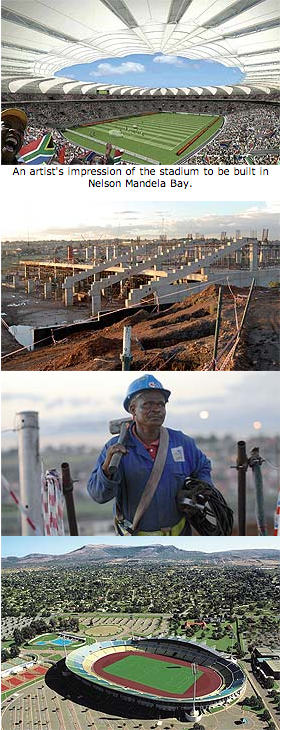 The building and up-grading of stadiums for the 2010 World Cup has started.
The building and up-grading of stadiums for the 2010 World Cup has started.
Even though stadiums are not built in every village or town in the country, all South Africa will benefit from 2010.
Stadiums and roads are not only being upgraded where the official World Cup games will be played. Some municipalities are upgrading smaller stadiums in their towns. These stadiums will be used for warm-up matches and training.
So, whether you live a few metres from Soccer City where the opening and closing ceremonies will take place, or many kilometres away, the benefits of the world's biggest soccer tournament should find you.
Some people will be able to get jobs during the building and upgrading of stadiums, roads and services like electricity and telephone lines.
Long after the 2010 World Cup, there will be benefits because the stadiums are built as multi-purposes centres. This means they will not only be used for soccer, but also for sports like rugby, tennis and athletics and for other gatherings.
Some permanent jobs will also be created because the stadiums have to be maintained and managed. Local people and small businesses will benefit from this.
"We can't afford a situation like in South Korea and Japan where they had to tear down stadiums after the World Cup because there was no further use for them," said Local Organising Committee head, Danny Jordaan.
"When the soccer has come and gone, something of value must remain that is there for all to see and enjoy."
The Stadiums
-
Royal Bafokeng stadium in North West, Nelson Mandela Bay stadium in the Eastern Cape and the Free State stadium will all accommodate 42 000 people after the upgrade in December 2008.
-
Peter Mokaba stadium in Limpopo and Mbombela stadium in Mpumalanga will seat 46 000 when they are completed in October 2009.
-
Soccer City in Johannesburg is expected to be finished in October 2009. It will have 95 000 seats.
-
Ellis Park in Johannesburg should be completed by December 2009. It will carry 61 000 people.
-
In Pretoria, Loftus stadium will seat 50 000 people when completed in December 2008.
-
King Senzangakhona stadium in Durban and the Green Point stadium in Cape Town will both seat 70 000 people when completed in October 2009.
- Ndivhuwo Khangale
Advice
Advice sadmin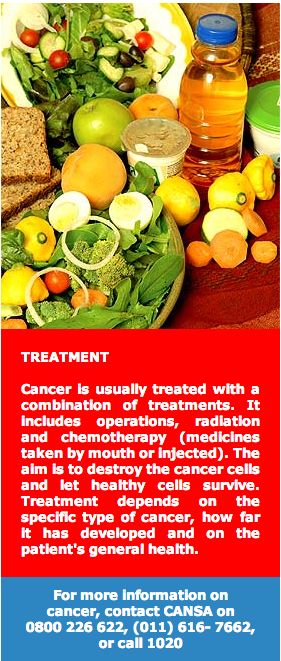 KEEPING CANCER AT BAY
KEEPING CANCER AT BAY
About one in every four South Africans gets cancer during his or her lifetime. More than 80 000 die from cancer every year says the Cancer Association of South Africa (CANSA).
But the good news is that if cancer is found early, it can be beaten. Today, chances of surviving cancer are higher than they were 30 years ago.
What is cancer?
Our bodies are made up of many different cells. Cancer begins when some of the cells start to swell or grow out of control in a certain part of the body.
If you notice any of the warning signs of cancer, you must go to your clinic or hospital immediately..
What are the signs?
There are many different types of cancer and some of them do not have clear warning signs. The most common signs are:
-
unusual bleeding or discharge (oozing)
-
a lump or thickening in the breast, neck, armpit, or anywhere else in the body
-
a sore that does not get better
-
constant coughing or changing of voice
-
constant indigestion and difficulty in swallowing
-
sudden, unusual weight loss.
Can cancer be prevented?
Research shows that up to 40 per cent of cancers can be prevented by having a healthy lifestyle, like:
-
not smoking and cutting down on alcohol;
-
eating balanced meals in-cluding lots of fresh fruits and vegetables.
-
eating unrefined starch like brown rice and whole-wheat bread rather than white bread and cakes.
-
eating less sugar and salt
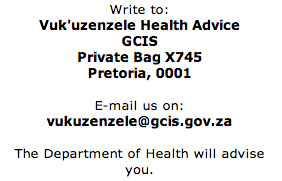
-
eating less animal fats like in meat and milk products
-
using canola oil instead of sunflower oil
-
drinking plenty of clean water
-
exercising regularly and not being overweight
-
protecting yourself from the sun
-
regular medical check-ups;
-
testing the womb for cancer by having a regular pap smear
-
checking breasts regularly for lumps.
Most common types of cancer
The most common types of cancer are breast cancer and cervical cancer (women), prostate cancer (men), lung cancer, liver cancer and skin cancer.
- Ndivhuwo Khangale
Building homes for the homeless
Building homes for the homeless sadmin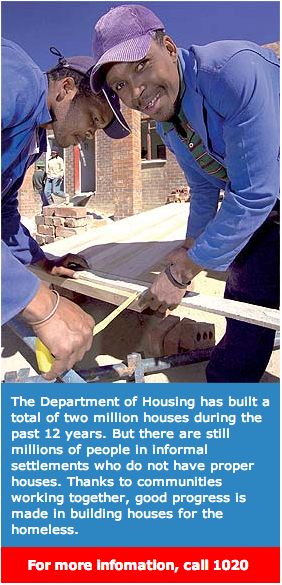 Building houses for South Africa's millions of homeless people is one of government's number one goals. To reach its target of getting rid of informal settlements by 2014, government has a number of plans in place. One of these is to work together with communities.
Building houses for South Africa's millions of homeless people is one of government's number one goals. To reach its target of getting rid of informal settlements by 2014, government has a number of plans in place. One of these is to work together with communities.
The People's Housing Process is a government programme which provides funds to communities to help them build houses. The funds given by the programme only goes to registered associations.
FEDUP
One of the associations that receives money is the Federation of Urban and Rural Poor Program (FEDUP). FEDUP is a community programe that encourages communities to build houses for themselves. By working together to build houses the communities not only get houses, but also gain skills because they do the work themselves.
To qualify for government funds, associations like FEDUP must not only be registered to build houses, but also for training
skills like project management. FEDUP is represented in all nine provinces and has helped communities build 20 000 houses in South Africa since 1996.
FEDUP does not depend on government funding alone. Its members also have to contribute money into a savings account.
FEDUP manages the daily and monthly savings of members, and until now R10 million has been saved from its 80 000 members. The money is expected to benefit over 500 000 people.
FEDUP helps beneficiaries to choose housing plans they can afford and invites the local authorities for quality inspections of the building.
Symbol of progress
One of the houses which FEDUP has contributed to building belongs to 75-year-old Nothima Kala. Her shack has been pulled down and a proper house built on the site. It stands a symbol of progress in the Joe Slovo Informal Settlement in the Eastern Cape.
Joe Slovo community members hope to see 1 600 residents of the informal settlement owning their own houses by the end of 2007.
The success story of Joe Slovo Informal Settlement is thanks to the residents' savings. They save according to what they can afford even if it is as little as R1.
- BuaNews
Cartoon Strip: Tourism Programmes
Cartoon Strip: Tourism Programmes sadmin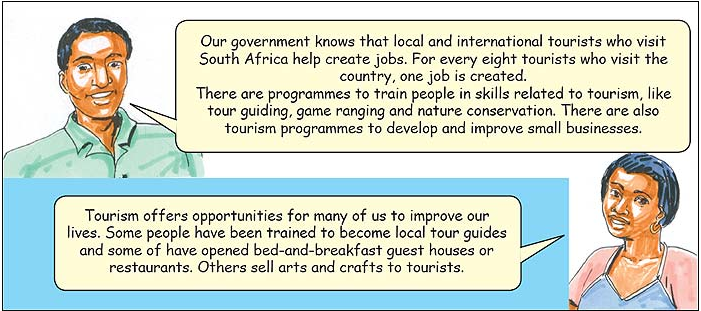
TRANSFRONTIER CONSERVATION AREAS
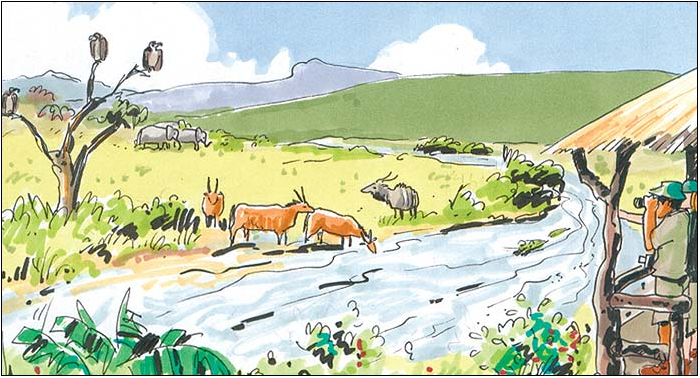
The Transfrontier Conservation Area Programme sets up wildlife conservation areas across South Africa's borders into our neighbouring countries. People who live near these conservation areas are part of the programme. They get opportunities to become employed in jobs like game ranging, construction, or making and selling arts and crafts.
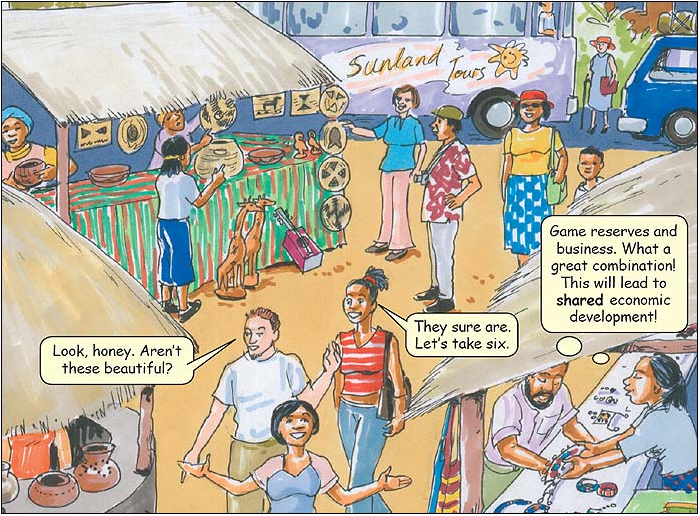
|
For more information, contact the BathoPele Call Centre at 1020 |
|
This panel first appeared in Building a People's Contract for Faster and Shared Growth, |
Fun page
Fun page sadmin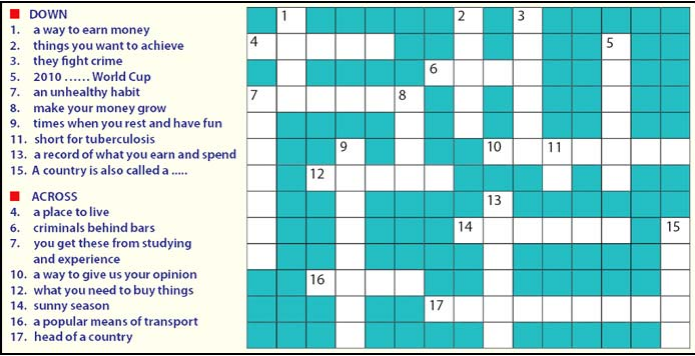
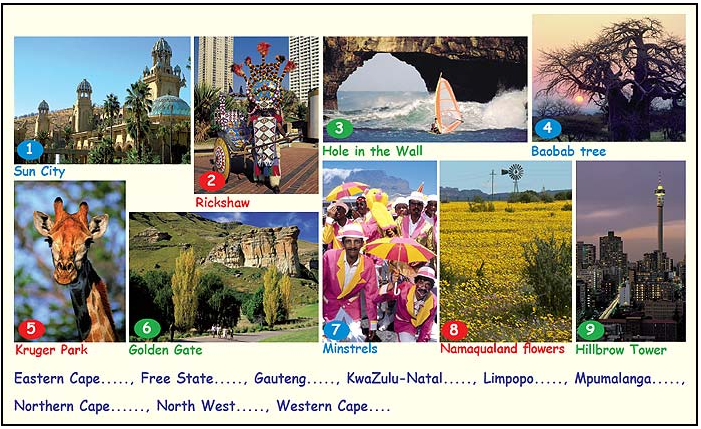
Helping to promote world peace
Helping to promote world peace sadmin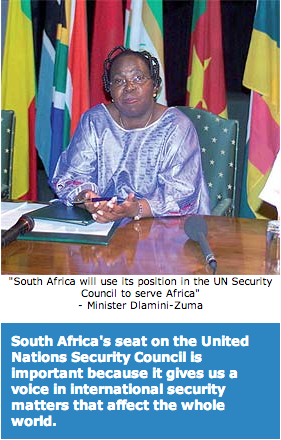 On 2 January this year, South Africa became a non-permanent member of the United Nations (UN) Security Council for the first time.
On 2 January this year, South Africa became a non-permanent member of the United Nations (UN) Security Council for the first time.
The UN is an association of countries set up in 1945 to promote peace and co-operation between nations.
Peace and security
The Security Council of the UN is its most powerful body. The Council's job is to help keep peace and security among the world's nations. It has the power to make decisions which UN member countries must carry out. The decisions of the Council are known as UN Security Council Resolutions.
The Security Council has five permanent members. They are China, France, Russia, Britain and the United States of America.
An honour
Being a non-permanent member of the Council means South Africa is one of ten nations from around the world that have a seat for a period of two years.
Foreign Minister Nkosazana Dlamini-Zuma, said South Africa was "greatly privileged and honoured" to be elected to this important Council. She said South Africa would use its new position on the Council to serve the continent of Africa.
Representing Africa
South Africa's seat on the Council is important because it gives us the opportunity to represent the rest of Africa when decisions are made.
South Africa will also be able to help prevent violence and wars and to find solutions to problems. In doing so, South Africa will have an opportunity to improve co-operation between the UN Security Council and the African Union Peace and Security Council.
South Africa's seat on the UN Security Council is also important because it gives us a voice in international security matters that affect the whole world.
- Louise van Niekerk
Job Interviews: Putting your best foot forward
Job Interviews: Putting your best foot forward sadmin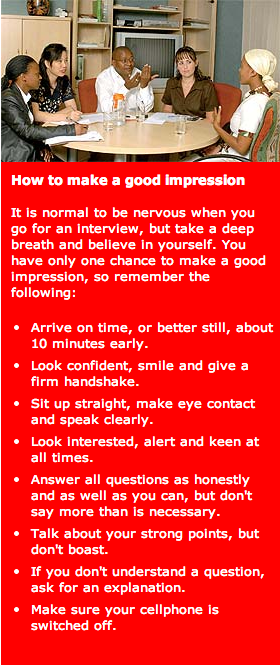 FINDING EMPLOYMENT
FINDING EMPLOYMENT
You've applied for a job and have finally been called for an interview. You really want the job and know you're ready for it, but do you know how to convince your employer?
Making a good impression during a job interview is one of the most important steps towards getting the job you deserve. So take some time to prepare yourself well.
How to prepare
The National Productivity Institute says improving productivity is not only a job for people with special knowledge - it should be a way of life for everybody. They give the following tips:
-
Make sure you know exactly where the interview will take place and at what time.
-
Find out how long it will take to get there and make sure you have transport that will get you there on time.
-
Find out as much as you can about the company and the division where you will be working.
-
Make sure you know what is involved in the job you're applying for.
-
Be ready to answer questions about what you have written in your curriculum vitae (CV) including your qualifications, skills and experience.
-
Prepare some questions you would like to ask about the job.
-
Decide what clothes you want to wear a day or two ahead of the interview and make sure it is neat and clean. Look professional without being too fancy. Don't wear clothes that are too tight, too small or uncomfortable.
-
Take an extra copy of your CV.
Things not to do
-
Never be late for an interview.
-
Don't smoke, eat, drink or chew gum.
-
Never lie about your abilities.
-
Don't talk about your personal or money problems.
Possible questions
You can never be sure which questions will be asked, but you can prepare answers to the ones that often come up in interviews. They include:
-
Why do you think you are the right person for the job?
-
What contribution can you make to the company/organisation?
-
Tell us about yourself.
-
What are your strong points?
-
What are your weaknesses?
-
How will you deal with difficult co-workers or situations?
-
Where do you want to be five years from now?
-
What salary are you seeking.
Remember, if you don't get the job, you are not a failure. Never give up, try your best - you will eventually succeed.
- Louise van Niekerk
Keeping it brief
Keeping it brief sadminFree State
The province's Education Department started a plan in February to help Grade 10 and 11 learners to prepare themselves better for the matric exams. The goal is to raise the province's matric pass rate to 85 per cent.
- BuaNews
Western Cape
In February, a group of 70 prisoners from the Pollsmoor and Malmesbury correctional centres wrote examinations in the first computer skills programme for prisoners in South Africa. It was made possible by the Shuttleworth Foundation, which donated 50 computers to these correctional centres. Courses will also be offered at other correctional centres countrywide.
- BuaNews
Mpumalanga
Three coal-fired power stations in the province that have been out of service since 1990, will be put into use again to help meet electricity needs. They are Camden and Grootvlei power stations, and the Komati power plant.
- BuaNews
Limpopo
The provincial Department of Local Government and Housing set up a call centre and anti-fraud hotline to help the public report corruption and fraud in the department. People can also contact the centre to make enquiries and get updated information on their housing applications.
- BuaNews
North West
The use of condoms is an important part of government's HIV and AIDS prevention plan, said Health Minister, Manto Tshabalala Msimang in Madibeng recently. She said the number of condoms for men distributed by government each month will be increased from 32 million to 40 million.
- BuaNews
For more information about the news items featured on this page, call 10200
Land reform: New farmers, new skills
Land reform: New farmers, new skills sadmin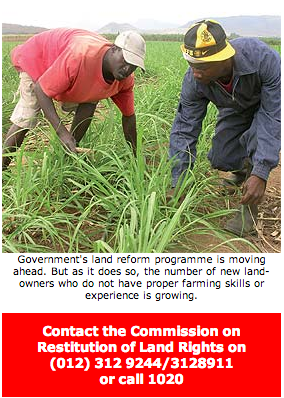 New land-owners must have special skills if they want to make a living from their farms. To help them, government has different programmes to develop their skills and keep their land productive.
New land-owners must have special skills if they want to make a living from their farms. To help them, government has different programmes to develop their skills and keep their land productive.
Joint projects
One plan gets companies and interested parties with experience and knowledge to help train new farmers. "They form joint projects with the local communities, teaching them new skills," said Land Affairs and Agriculture Minister, Lulu Xingwana.
She said previous owners of farms who were prepared to help teach new owners were also part of this plan.
In KwaZulu-Natal, for example, a previous farm owner who has the necessary experience and knowledge agreed to help new owners to keep the land productive.
Agreement
The previous owner entered into a 10-year agreement with the community. They appointed a committee that works closely with him to see first-hand how the farm is run. In this way they learn how to farm productively, while getting business and management skills.
When the contract ends, the community should be able to stand on its own feet and run the farm on their own as a successful business.
During a recent land hand-over ceremony in Brits in the North West, the Agricultural Department, said the department was building relationships with previous land-owners for skills training.
Finding solutions
Chief Land Claims Commissioner, Tozi Gwanya, said the Commission on Restitution of Land Rights keeps looking for ways to help new owners use their land in the best possible way.
He said some new land-owners preferred to get money for their land. This is because they had already settled somewhere else and it would be difficult to start over at a new place.
"But we encourage beneficiaries of the land reform programme not to sell their properties for at least up to five years after receiving it," he said.
"We ask them to rather rent out their land to people who can use it well. In this way the community would still benefit from their land without selling it and losing it for good," he said.
- BuaNews
Letters to the editor
Letters to the editor sadmin
Don't lose your dreams
I am a 16-year old teenager and I have a dream that keeps me clean and away from drugs. It is my dream of becoming an engineer one day. The drug market in South Africa is growing every day - young people turn to drugs for comfort, but drugs only add to their problems! I don't judge people who use drugs, because I don't know what they are going through. We are all born neither good nor bad, it's just that some of us have lost our way and our dreams.
- Kgally Mashaba, Kuruman, Northern Cape
Stigma of HIV and Aids
I am taking anti-retrovirals and I don't mind my name being published. I am leading a healthy life. The government's in-tentions are good, but they still perpetuate the stigma of HIV and Aids. Why do they treat this disease on its own platform and not the same as any other life-threatening disease? Clinics and VCT centres are clearly marked and this in itself amounts to some sort of disclosure. If you walk into their waiting rooms you are met by scared, miserable and paranoid people. Nurses and lay councillors treat patients as though the virus has somehow affected them mentally. Do not make HIV and Aids stand alone. This makes people resent and abhor being identified. Some people would rather die in isolation without help and support instead of being identified as being HIV positive
- Rathabeng Elias Mamabolo, Sovenga, Limpopo
Talk about your status
I am a 28-year old mother living with HIV. When I found out I was HIV positive, I was scared and I thought my life was over. I read in Vuk'uzenzele about HIV and Aids and how to live with the virus. I thank Vuk'uzenzele for giving me the strength to talk to my family and friends about my status. I am not scared anymore because they accept me as I am. All young mothers out there must take this disease very seriously. Please don't be shy to get tested before you fall pregnant. Know your status. I know it is not easy, but you must talk to people who can help you.
- BDG, Rustenburg, PO Box 447, Rustenburg, North West
Ignorance is killing us
It is sad and painful to see young people doomed to death by HIV and Aids due to ignorance. Our loved ones and friends die almost every day and we pretend that we know nothing about the disease.
Now is the time to learn from their mistakes and move forward positively and sensibly. We have to realise the position we are in because we are the leaders of tomorrow and the future is ours.
- Harmans Pholo, Allanridge, Free State
Taking responsibility
Our government can only make sure that there are free condoms available for the sexually active public, but cannot force anyone to wear them. The same applies to the dangers of drinking and driving. We have to take responsibility! We must meet government half-way by ensuring that a five-year old boy doesn't lose his father because of drunk driving or a mother doesn't lose her son or only daughter to Aids because they had sex without protection. It is as much our responsibility to listen as it is government's to do the talking.
- Mbulelo Samuel Zito, Somerset East, Eastern Cape
Believe in yourself
I am a teenager and I believe if others can get up and do it for themselves, so can I. I'd like to say to everyone: Be the best that you can be. Be proud of your achievements no matter how small they may seem. Dream about success and work hard to make your dreams come true. Don't waste your life - don't look back when you are old and think about all the things you could have been if you had tried harder, try now. Believe that if you want something you can make it happen. Let Vuk'uzenzele magazine make you get up and smell the fresh air to a bright future.
- Pinky Ndaba, Greytown, KwaZulu-Natal
Thank you
Thank you very much for educating us. I am an ABET practitioner and I have used copies of Vuk'uzenzele the whole of last year. They provided information for many subjects. The topics that helped for exams were the national symbols and the national orders, to mention just a few. You made my day when you wrote about the powers of Parliament. I wish everyone will read it and stop blaming the President for everything that happens in Parliament. Keep it up!
- Tepo Kopa, Marquard, Free State
Making opportunities work for you: Craft your income
Making opportunities work for you: Craft your income sadmin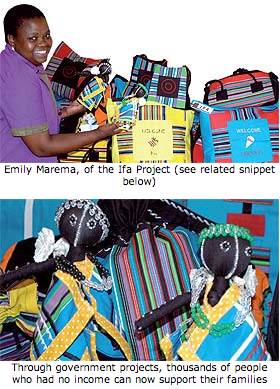 Investing in culture can create jobs, fight poverty, improve skills and promote tourism.
Investing in culture can create jobs, fight poverty, improve skills and promote tourism.
A programme, called Investing in Culture, was started by the Department of Arts and Culture. Money is given to projects that empower communities. It trains people to make art and craft your items and to take part in cultural performances like dancing and singing and making money out of this.
Exhibit overseas
Through the department's projects, thousands of people countrywide who had no income, can now support their families.
Some make and sell articles like beaded crafts, sculptures, clothing and pots. Others earn money by taking part in performances that attract tourists. Some of the products are sold in big clothing shops around the country. They are also sold and exhibited overseas..
AsgiSA
These projects are in line with the Expanded Public Works Programme. This, in turn, is part of the Accelerated and Shared Growth Initiative of South Africa (AsgiSA).
The Investing in Culture programme is also part of a government effort that gives skills training to help create jobs and develop communities.
Countrywide
There are now 146 Investing in Culture projects countrywide. The Department of Arts and Culture budgeted a total of R88 million for these projects last year alone.
Until now, more than 2 480 jobs have been created. Many of these jobs were given to unemployed women and youth. Consideration has also been given to disabled people who are also included.
Some of the Investing in Culture projects in Gauteng and in the Western Cape have won awards for contributing to and improving people's lives. Arts and Culture has improved the quality of lives of many disadvantaged people by creating employment.
- Ndivhuwo Khangale
To qualify for Investing in Culture projects
- People in the project must be from previously disadvantaged communities.
- Projects must be about arts, culture and heritage.
- People in the project must have the ability to learn new skills.
- Products and services should be of a high enough quality to be sold locally and overseas.
- Projects must be owned by community members and must directly benefit them in terms of jobs and training.
- Projects should support and promote tourism.
- Projects should give preference to employing women, youth and disabled people.
Related snippets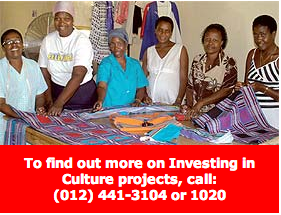
The Ifa Craft Project in Thohoyandou, Limpopo, is one of the most successful Investing in Culture projects. Ifa is a TshiVenda word meaning "legacy."
Twenty women from villages around Thohoyandou are part of the project. They make products like handbags, shopping bags, cushion-covers, tablecloths, mats and pillow-cases using the colourful TshiVenda traditional cloth called 'nwenda'.
The project received R500 000 from the Department of Arts and Culture for training, marketing and general operations last year. Project manager Emily Marema said all the women were un-employed before the project started. The department asked the municipality to find people who could be trained to make crafts. They chose us and sent people Vendafrom Pretoria to train us for a few months.
"Our project made more than R140 000 last year. We are now able to provide for our children and send them to school. Some are even building better houses for their families," Marema said.
"Shops in big cities like Johannesburg and Pretoria are now ordering Ifa products." "I have also been to Germany, the United States of America and Italy to sell and exhibit the products."
Making opportunities work for you: Helping informal businesses grow
Making opportunities work for you: Helping informal businesses grow sadmin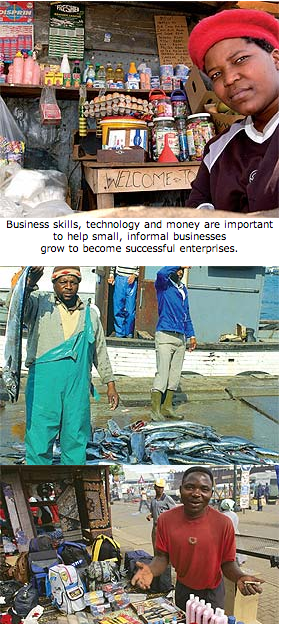 A study showed that about 31 per cent of South Africa's workers are part of what is called the informal economy.
A study showed that about 31 per cent of South Africa's workers are part of what is called the informal economy.
This includes people who do not have the necessary skills to be in full-time, secure, jobs. They run small, informal businesses and lack money to make their businesses grow.
AsgiSA
One of the major aims of the Accelerated and Shared Growth Initiative of South Africa (AsgiSA) is to close the gap between the First Economy and the Second Economy.
In his State of the Nation address in February this year, President Thabo Mbeki said the struggle to get rid of poverty will continue to be an important part of government's effort to build the new South Africa.
To help government fight poverty, the Department of Trade and Industry has programmes and agencies to help people grow their small businesses.
The agencies support them with money, business skills, markets and technology to run their businesses.
Agencies
The department's agencies include the Small Enterprise Development Agency (seda), the South African Micro-Finance Apex Fund (samaf), Khula Enterprise Finance, the South African Women Entrepreneur's Network (SAWEN) and the National Empowerment Fund (NEF).
Apex Fund (samaf)
The Apex Fund is a company started by government to help reduce unemployment and poverty by supporting entrepreneurs. They give loans of up to R10 000 to people starting up small businesses.
The Fund also encourages people to save money through savings plans like burial societies and stokvels.
NEF
The NEF was started by government to help previously disadvantaged people to grow businesses started and run by them. Depending on the kind of business and its size, it will give from R250 000 up to R50 million.
Khula
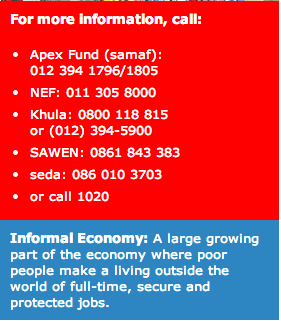
Khula Enterprise helps small, medium and very small enterprises or projects to get loans from financial institutions like banks. Through its Thuso Mentorship Programme, Khula also gives mentorship services to guide and advise entrepreneurs on how to manage their businesses.
SAWEN
Women often face problems when they want to start their own businesses. SAWEN is an agency that specifically helps women start, run and grow their businesses. SAWEN brings together women entrepreneurs and get government and private institutions to support them.
Seda
Seda was started in December 2004. Its role includes the support of co-operative enterprises, particularly those in rural areas.
- Ndivhuwo Khangale
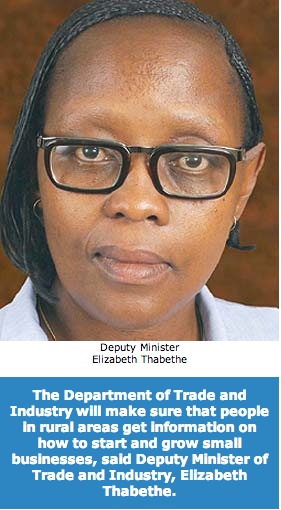 RELATED SNIPPETS
RELATED SNIPPETS
Be on your guard when you start a business
Many poor people in the rural areas are ready and willing to start their own businesses to create jobs and fight poverty, but they lack information on how to do so.
The Deputy Minister told Vuk'uzenzele it was an important goal of the Department of Trade and Industry to inform people about the economic opportunities that are available to them.
Everyone should know how to start a business. She said the department has been undertaking road shows countrywide to inform people how to register and start their own businesses.
Speaking about the department's agencies, she said some of these have been started specifically to help women, but very few women knew about them.
Be careful
"We have heard of organisations charging people up to R4 000 to register businesses when they can spend less than R500 if they do it through the offices of the Department of Trade and Industry. It is difficult for us to act against those organisations because there is no law to stop them. Those organisations know that many people are willing to pay a lot of money because they are not aware that they are being charged too much", Thabethe said.
Own languages
She said the department planned to increase the number of offices in the provinces to make it easier for the many people in rural areas to get the information they needed.
They realised that people would understand the information better in their own languages. The department would therefore make sure that it would be available in all the official languages.
"We are now distributing pamphlets in languages spoken in the area we visit, and will also speak to them in their own languages. We have visited all the provinces, informing them about our different agencies" she said.
Now anyone can open a bank account
Now anyone can open a bank account sadmin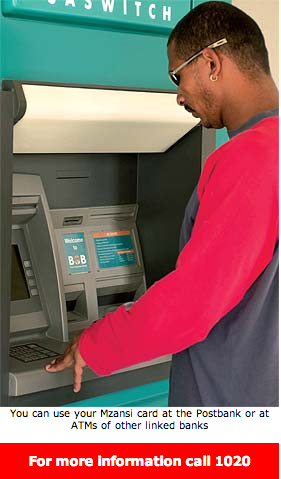 MAKING OPPORTUNITIES WORK FOR YOU
MAKING OPPORTUNITIES WORK FOR YOU
Gone are the days when a bank account was only for those who earn a salary or have a lot of money.
Now, all you need is a valid South African identity document and at least R10 in your pocket to open a Mzansi bank account. Mzansi was started to make banking easy for the more than 13 million people who have never used a bank before. It is also a way of making banking more affordable for people who earn small salaries.
Different banks
The Banking Association of South Africa (BASA) started Mzansi in October 2005. They invited all the major banks in South Africa to take part in the project.
Four banks, namely Standard Bank, ABSA, Nedcor and First National Bank, as well as Postbank, a division of the South African Post Office, acted on BASA's call. Government also supported the plan and came up with ways on how the bank could be best used.
An agreement was signed to make co-operation between the government and the banks easy.
Free
You can open a Mzansi bank account free of charge at the Postbank and other participating banks. To do this you must deposit at least R10 and show your ID document. There is no minimum balance fee to keep the account working.
When you have opened your account, you will get a bank card that you can use at the Postbank or at the ATMs of the other participating banks. No additional cost is charged for using those ATMs.
Reduces fees
Except for the free monthly service given by all the participating banks, the different banks have their own pricing for other business
deals. For example, the Postbank does not charge a fee for opening an account, depositing money, statements and balance inquiries.
For more information about fees at other banks, you should talk to the bank where you opened your account.
Once the balance in your account reaches R25 000, your account is switched from Mzansi to a normal bank account.
Since Mzansi started, Postbank has opened more than 1,38 million accounts.
- Ndivhuwo Khangale
One call away: Making things easier for consumers
One call away: Making things easier for consumers sadmin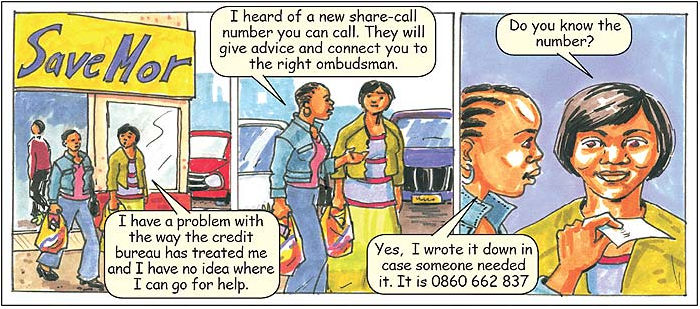
 You can now call one number to contact the Banking Ombudsman, the Long-term Insurance Ombudsman and the Credit Information Ombudsman.
You can now call one number to contact the Banking Ombudsman, the Long-term Insurance Ombudsman and the Credit Information Ombudsman.
If you are not sure which of them deals with your specific problem, just call the share-call number 0860 662 837. They will give you advice and connect you directly to the right office.
Helping consumers
The offices involved in this new service believe it is an important way of making things easier for consumers. They hope that the other ombud offices in the industry will soon start a similar service to help consumers.
Credit Information Ombud, Manie van Schalkwyk, said consumers were becoming more aware that the different ombudsmen can help them and that they can register their complaints free of charge.
He said the share-call service will end the frustrations of trying to find out which office to contact and getting hold of the right number.
Step forward
Ombudsman for banking Services, Neville Melville, said the system has proved to be very successful in Australia.
Justice Peet Nienaber, Long-term Insurance Ombudsman, said the idea of a centralised number was an important step forward for consumers.
"The single telephone number benefits both consumers and ombud offices," he said.
The new number is an additional service. It does not replace the existing telephone numbers of the different ombudsmen's offices.
- Ndivhuwo Khangale
President Mbeki: Speak with one voice
President Mbeki: Speak with one voice sadmin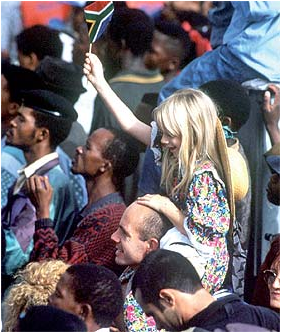 South Africans should work together no matter what political parties they belong to. They should get to know each other better and have more discussions about common goals no matter what language they speak.
South Africans should work together no matter what political parties they belong to. They should get to know each other better and have more discussions about common goals no matter what language they speak.
This was the message from President Thabo Mbeki following discussions about his State of the Nation Address.
After President Thabo Mbeki delivered his State of the Nation Address, he listened to political party leaders in the National Assembly as they debated what he said in his speech on February 15.
Deepen the debate
The President said he was touched by the discussions which were mostly in line with Parliament's: wish to deepen the debate in South Africa.
Mbeki spoke of the need to develop "a sufficient national cohesion
enabling all of us to speak in a common vocabulary that we share, whatever language we use."
By "national cohesion" the President was talking about the need for all South Africans to work together, know each other better, discuss common goals and speak with one voice.
The President noted the words by Pieter Mulder of the Freedom Front Plus when he said: "We do not know each other and do not debate with each other." He said the two-minute speeches in Parliament were not debates.
Mbeki also spoke about the words of Bantu Holomisa of the United Democratic Movement who said: "We as South Africans have not yet found each other on a number of issues."
Listen to each other
Mbeki added that he took very seriously words by the Democratic Alliance leader Tony Leon when he said that as a nation we should spend more time listening to each other.
We should not be too quick to judge the concerns and expressions of other groups of the population, Leon said.
The President also took note of the words by Naledi Pandor, the Minister of Education. She said: "We must today renew our promise to speak together of freedom, to work together to build a South Africa with one dream."
Mbeki said if South Africans did not know each other, they could not develop a common knowledge about problems or have common goals.
- Ndivhuwo Khangale
Role Model
Role Model sadmin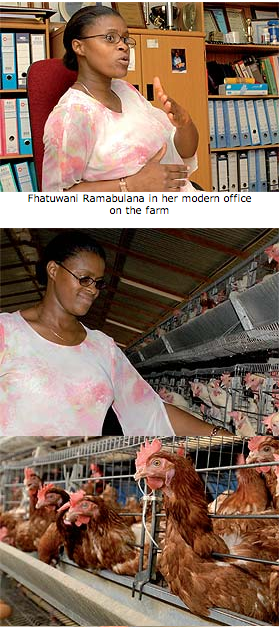 Men seem to like to give orders, while women prefer getting the job done themselves. This is one of the reasons why women are successful farmers, says Fhatuwani Ramabulana, the youngest female farmer and one of the most successful farmers in Limpopo.
Men seem to like to give orders, while women prefer getting the job done themselves. This is one of the reasons why women are successful farmers, says Fhatuwani Ramabulana, the youngest female farmer and one of the most successful farmers in Limpopo.
Ramabulana, a well-known farmer in Venda, says farming is very tough and needs people who do a hands-on job instead of giving
orders from a distance.
Woman of the Year
Still in her early 30s, Ramabulana won the Shoprite Checkers Woman of the Year Award in 2002. She is a trained teacher, but has never worked as a teacher. Instead, she runs a big poultry farm selling eggs and chickens in Khumbe village.
Big responsibility
After completing her teaching diploma in 1998, she joined her parents' business, Khumbe Poultry Farm, as a secretary. The following year her father died in a car accident and Ramabulana took over as manager.
She said it was a big responsibility especially because she was very young. But she had to tackle the challenges that came her way.
"Thinking of how my father started, I knew I couldn't allow the business to go down. He taught me a lot, like working with clients and marketing the business."
Ramabulana's father started in the early 1980s in Tshakhuma selling chickens from a mud hut. In 1985, he bought some land in Khumbe and employed three workers. The business grew and became very successful. He has since won several awards.
When he died, the business's turnover was about R4 million per year. Today, Ramabulana is the general manager, her mother is the director and her sister and two brothers are managers responsible for other operations.
The business now has branches in Elim and Makhado. The turnover is about R7 million per year and they employ 50 full-time workers. "We have 46 390 chickens and sell about 248 500 eggs per week," Ramabulana said . "The demand is very high and we keep growing. We sell our eggs to wholesalers throughout the province and to grocery stores and the community."
The business has also put some-thing back into the community by sponsoring two local soccer teams and helping poor children with school fees and uniforms.
- Ndivhuwo Khangale
Something for everyone: How the budget affects you
Something for everyone: How the budget affects you sadmin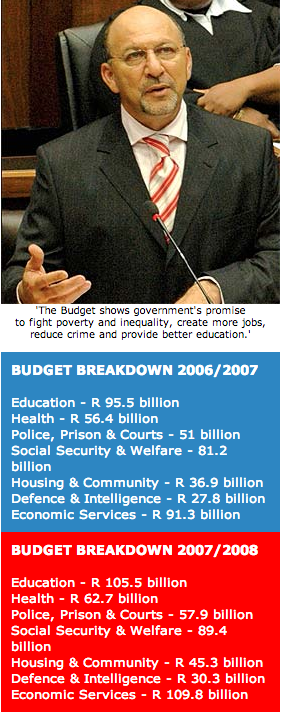 Finance Minister Trevor Manuel made members of the National Assembly laugh when he explained in his joking way what the amount of R2 trillion to be spent by government in the next three years looks like. "Madam Speaker," he said "That's a two followed by 12 zeros."
Finance Minister Trevor Manuel made members of the National Assembly laugh when he explained in his joking way what the amount of R2 trillion to be spent by government in the next three years looks like. "Madam Speaker," he said "That's a two followed by 12 zeros."
Manuel's budget again showed government's promise to fight poverty and inequality, create more jobs, fight crime and provide better education. This is because "we have a shared pledge to work together in action," he said.
Equal worth
The time was right that all South Africans should benefit from the social security system, he said. "The idea that human life is worth equal, is the main value that unites South Africans."
"A human being is a human being, there is no lesser human being," was the theme of his speech.
For the period 2007 to 2008, government has budgeted R534 billion.
Save for retirement
This will be used for employing more teachers, police officers, hospital staff and building infrastructure like roads and stadiums for the 2010 World Cup.
The state's old-age pension, disability and dependency grants have been increased by R50 to a maximum of R870 a month.
The child support grant has been increased by R10 to R200 a month, while the foster care grant rises from R590 to R620 a month.
One of the positive developments in this year's budget is the plan to introduce a scheme that will force every working person to save for retirement. This is to make sure that people are able to afford basic needs like food when they retire.
A total of R700 million has been put aside for bursaries for teacher training. Some of the R8,1 billion budgeted for education, will be used for no-fee schools, new classrooms, water and toilet facilities and the development of skills.
Housing
To speed up the process of building houses, the Department of Housing gets R32 billion for housing in the next three years.
A total of 250 000 people living with HIV and Aids will benefit from the R17 billion that has been budgeted for the country's HIV and Aids programme.
As usual, the losers in this year's budget are smokers and drinkers. A packet of a 20 cigarettes goes up by 60 cents, while a can of 340ml beer goes up by five cents.
- Ndivhuwo Khangale
Special Edition Feature
Special Edition Feature sadmin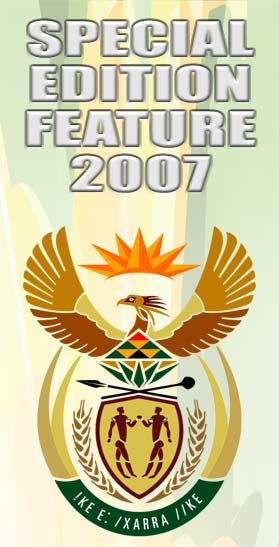 PROGRAM OF ACTION 2007
PROGRAM OF ACTION 2007
A National Partnership to build a better life for all
'Working together, we can and shall succeed in meeting the common objective we have set ourselves as a nation - to build a better life for all.'
'We are not there yet. But no one, except ourselves, shall ensure that this dream is realised. And so, let us roll up our sleeves and get down to work, fully understanding that the task to build the South Africa for which we yearn is a common responsibility we all share.'
President Thabo Mbeki - State of the Nation Address, 9 Feb, 2007
When the Government was elected in 2004, it set out to meet the mandate that the people of South Africa had given it in the election.
It was a mandate to build on what South Africa had achieved in the first Ten Years of Freedom. It was a mandate to continue building a better life for all.
When we celebrated Ten Years of Freedom, just after the elections of 2004, President Thabo Mbeki spoke of that vision. Encouraged by the determination of all South Africans to work together, he made a pledge, on behalf of all of us - that we would continue to work together to change South Africa into a country defined by a shared dream.
The new Government committed itself to work with all South Africans to implement detailed programmes that would let the country move forward as quickly as possible to build the new South Africa. Creating jobs and reducing poverty are at the heart of these programmes - we need to succeed in those things to solve all our other problems.
Now that we are half way through the five years the Government was elected to serve, it has carried out a Mid-Term Review. It has asked if we are on track to do those things that must be done by 2009. It has looked at what must be done to continue progress and to overcome weaknesses in implementation.
We have made progress since 2004 in further changing South Africa for the better. However, there are also many difficulties we still confront and many tasks to complete.
In its Programme of Action for 2007, government will continue to work hard to ensure that the nation's objectives are met and to meet its commitments to the people.
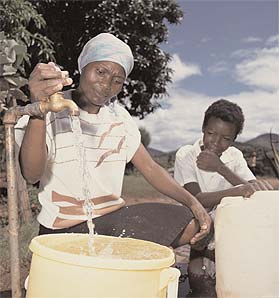
IN 2004, WE COMMITTED TO PROGRAMMES TO:
-
increase investment in the First Economy
-
reduce the cost of doing business
-
promote small and medium business
-
speed up skills development
-
improve export performance, focussing on services and manufacturing
-
spend more on scientific research and development
-
respond to the challenges of the Second Economy
-
ensure Broad-Based Black Economic Empowerment.
PROGRESS AND CHALLENGES
SIGNS OF GROWTH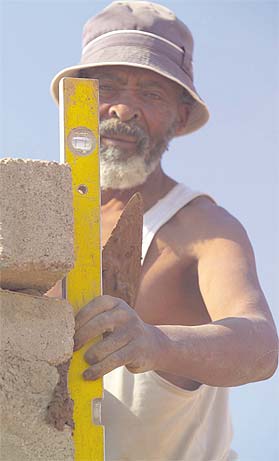
-
Our economy has grown over 4,5% a year since 2004, the fastest for 20 years.
-
Public- and private-sector investment has been increasing 11% a year - it is now at its highest since 1991.
-
The number of employed people has grown half-amillion a year in the past three years.
-
Black people in top management have increased from 24% to 27% - but that is still very low.
-
Progress has been made in implementing the Accelerated and Shared Growth Initiative for South Africa (AsgiSA) to overcome the things holding our economy back from faster growth.
-
Government and university leaders have agreed on resources needed to ensure that skills in short supply are provided.
-
There are many more non-fee paying schools.
MAJOR CHALLENGES
-
Growing prosperity has led to huge growth in consumerdemand. Our big infrastructure projects need a lot of supplies and machinery. However, our economy doesn't yet have the capacity to produce enough consumer and capital goods, which we have to import.
-
South Africans are not saving enough. So we have to depend on savings from other nations.
-
The value of the Rand is still too unstable to get the best out of our export industries.
-
We need to do much better in creating employment opportunities. We need a bigger Expanded Public Works Programme (EPWP). We need to create selfemployment through small and micro enterprises; and to do more for young people through the National Youth Service and the development of young entrepreneurs.
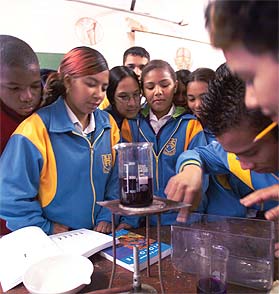
IN 2007, WE WILL:
-
speed up implementation of AsgiSA and other economic programmes.
MANAGING THE ECONOMY
-
We will complete the review of our country's experience in managing the relationship between the exchange rate, inflation and interest rates. This will help us put in place steps to grow industries that produce things for both the domestic and export markets, and that can take in many semi-skilled workers.
NATIONAL INDUSTRIAL POLICY FRAMEWORK
In line with this new industrial policy framework, we will:
-
Speed up plans to facilitate investment in business process outsourcing, tourism, biofuels and chemicals, and finalise programmes for forestry and paper, clothing and textiles, metals and engineering.
-
Develop a strategy to prioritise key interventions in mining and mineral beneficiation, agriculture and agro-processing, the white goods (household appliances) sector, creative industries, community and social services and pharmaceuticals. We will set up the State Diamond Trader that will purchase 10% of diamonds from local producers and sell them to local cutters and producers.
-
Develop programmes to enable investments in sectors that supply our infrastructure programmes, including capital goods in communications, transport and energy:
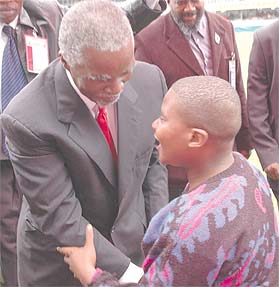
Speed up work to ensure more use of nuclear power generation, natural gas and renewable sources of energy.
-
Finalise plans with mobile telephone companies and Telkom to reduce the cost of calls between cellphones and Telkom lines.
-
Identify areas for 10 development call centres, each employing 1 000 persons. Telkom will apply a special low rate for international bandwidth, as part of our effort to expand the Business Process Outsourcing sector.
LOWERING THE COST OF DOING BUSINESS TO PROMOTE INVESTMENT
-
We will also take steps to improve competition in the economy. We will lower the cost of doing business and promote investment, through:
-
practical introduction of the Regulatory Impact Assessment system
-
developing high-speed national and international broadband capacity
-
finalising the plan to build capacity of the rail and port operators
-
strengthening our competition authorities.
SKILLS DEVELOPMENT
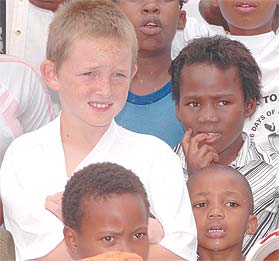
-
Progress in recapitalising Further Education and Training (FET) colleges means we can expand the number of artisans we have. Starting this year, we will provide financial assistance to trainees in need who enter FET colleges.
IN 2007, WE WILL:
-
take more action to increase access to micro-finance through the Apex Fund (Samaf) and the agricultural microcredit fund (Mafisa)
-
ensure that the Small Enterprise Development Agency (Seda) is functioning properly
-
process the Companies Bill after public comment as part of the measures to reduce the regulatory burden on small, medium and micro enterprises and to empower minority shareholders and employees
-
start implementing the Communal Land Rights Act, 2004 to improve economic utilisation of shared land, and increase support such as irrigation, seeds and implements to small and co-operative farmers
-
engage at least 20 000 more young people in the National Youth Service on top of the 10 000 already involved; enrol 30 000 young volunteers in community development initiatives; and employ 5 000 young people as part of the EPWP in the maintenance of government buildings
-
intensify efforts to integrate youth development into the mainstream of government work, including a youth co-operatives programme, and the ongoing efforts to link unemployed graduates with employment opportunities.
IN 2004, WE COMMITTED TO PROGRAMMES TO: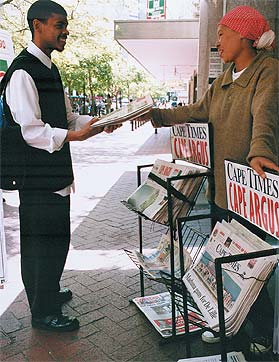
-
continue building a social security net to alleviate poverty
-
expand access to services like water, electricity and sanitation
-
improve the health of the nation
-
intensify the housing programme
-
implement further measures to open wider the doors of learning and of culture.
PROGRESS AND CHALLENGES
In line with our commitment to build a caring society, we have since 2004 improved service provision and other aspects of the social wage:
-
Now 11 million people receive social grants compared with eight million in 2004.
-
300 000 new housing subsidies have been allocated in the past two years.
-
Access to basic water supply has improved from 59% in 1994 to 83% in 2006 - however, eight million people are still without piped water and many more are without electricity and sanitation.
-
In one year since 2005, the backlog in doing away with the bucket system in established settlements was cut by almost half - we are on track to end this dehumanising system in these areas during 2007.
-
We have started to implement programmes to improve passenger transport, including taxi recapitalisation and provincial initiatives (like the Moloto Rail Corridor in Mpumalanga, Klipfontein Corridor in Cape Town and Gautrain). These are part of a comprehensive passenger transport strategy to improve the quality of life of especially working people.
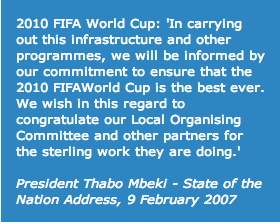
-
Some slow improvement in education and skills, from quite a high base, including literacy, school enrolment and participation in higher education. Much more needs to be done to ensure steady improvement in Grade 12 pass rates and to increase the number of Grade 12 learners who pass Mathematics.
DURING 2007, WE WILL DO THE FOLLOWING
SOCIAL SECTOR PROGRAMME OF ACTION FOR 2007
The success of our democracy should and will be measured by the concrete steps we take to improve the quality of life of the most vulnerable in our society.
INTEGRATED ANTI-POVERTY PROGRAMME
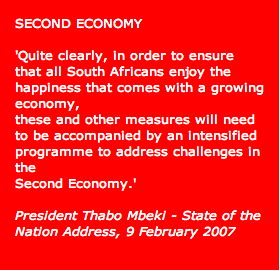
-
Work towards an integrated anti-poverty programme that targets households living in poverty, so that we make the biggest impact and avoid wastage and duplication. It will help us link beneficiaries of social assistance to municipal services and work opportunities, so that as many people as possible enter the labour market and end their dependence on social grants.
-
Complete work to reform our system of social security so we can start implementing it as soon as possible. The new system will be finalised after consultation with our social partners around an approach that includes:
-
continuing the existing minimum benefits of our social grants system
-
a wage subsidy for low-wage employees - this may be directed at first entrants into the job market, especially young people
-
a social security tax that will go towards basic retirement savings, death, disability and unemployment benefits
plans to reach vulnerable children older than 14 years.
BETTER HUMAN SETTLEMENTS
-
Speed up the building of low-cost housing by urgently establishing a Special Purpose Vehicle to handle finances; piloting the Land Use Management Bill; and finalising the agreement with the private sector on lowcost housing.
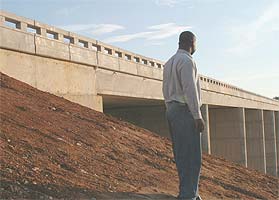
-
Speed up implementation of taxi recapitalisation, and implement plans for passenger rail and road transport, including the Bus Rapid Transit System in the metros and recapitalisation of Metrorail.
-
Complete plans to implement the final stages of our programmes to meet the targets for universal access to water in 2008, sanitation in 2010 and electricity in 2012.
-
Put in extra effort in dealing with the remaining cases of land restitution and find ways of speeding up land redistribution.
EDUCATION AND TRAINING
-
Expand access to Early Childhood Development, as part of the programme to improve the general education system and as part of the EPWP.
-
Expand training and the employment of nurses, social workers and auxiliaries; increase training institutions; improve the quality of training; and put in place a bursary system.
-
Continue implementing the remuneration dispensation for medical professionals, and provide additional resources further to improve teachers' pay levels.
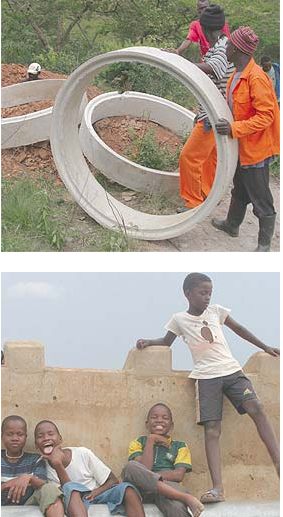
HEALTH
-
Ensure implementation, without further delay, of plans to reduce the cost of medicines.
-
Continue work to address the various non-natural causes of death in our society as well as lifestyle diseases, malaria, the various strains of tuberculosis (TB), road accidents and violent crime.
-
Intensify the campaign against HIV and AIDS and improve implementation of the comprehensive approach, including prevention, home-based care and treatment. We shall ensure that the partnerships built over the years are strengthened, and that our improved national comprehensive strategy against AIDS and sexually transmitted infections is finalised as soon as possible.
SOCIAL COHESION
-
Finalise the strategy and programmes to strengthen social cohesion, including a comprehensive, integrated antipoverty strategy and deal with issues related to national unity, value systems and identity.
South Africa is still transforming from a divided and bitter past. We have made much progress towards equality, nonracialism, non-sexism and in restoring human dignity. But many challenges still hold us back from achieving more as a country and truly transforming our society. We need to make a conscious, determined and sustained effort to build a nation free of the past.
IN 2004, WE COMMITTED TO PROGRAMMES TO:
-
improve the safety and security of all citizens and communities.
PROGRESS AND CHALLENGES
The targeted figure of 152 000 police officers employed in the South African Police Service (SAPS) has been surpassed and training has improved - but the impact of this is not yet enough for everybody to feel a better sense of safety and security. Most contact crimes have been reduced but the annual reduction rate in robbery, assault and murder is still below the 7% - 10% we had targeted. The abuse of women and children continues at an unacceptable level.
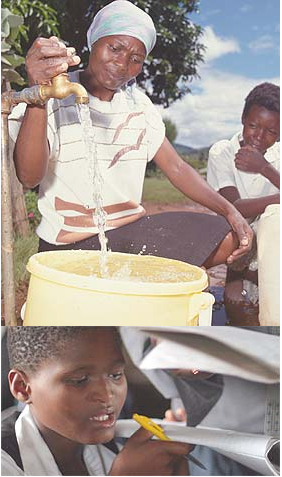
IN 2007, WE WILL:
-
undertake a sustained drive to improve safety and security, with further measures in addition to our many
ongoing programmes.
BUILDING THE CRIMINAL JUSTICE SYSTEM
-
Make best use of the justice system's new technology and improving the functioning of our courts, to reduce case backlogs.
-
Finalise plans to transform the judiciary and improve its functioning, in consultation with the judiciary.
-
Bring the operations of the Department of Home Affairs to full capacity, by filling vacant posts, improving systems and implementing other recommendations of the Task Team that has been working with the Minister to improve the department's work.
-
Implement the recommendations of the Khampepe Commission on the mandate and operations of the Scorpions.
-
Ensure that decisions to expand the Correctional Services infrastructure are put into practice, improve management of Border Control and make sure that immigration and documentation services are implemented.
STRENGTHENING THE SOUTH AFRICAN POLICE SERVICE
-
Continue improving pay and working conditions of the police, and further expand the personnel of the SAPS to over 180 000 within three years.
-
Bring to full capacity the forensic laboratories equipped with the latest technology and ensuring optimum use of the finger-print database.
INTELLIGENCE
-
Intensify intelligence work related to organised crime, based on recent successes in dealing with cash-in-transit heists, drug trafficking and poaching.
-
Continue to further capacitate our intelligence agencies, and ensuring that they always operate within our Constitution and laws.
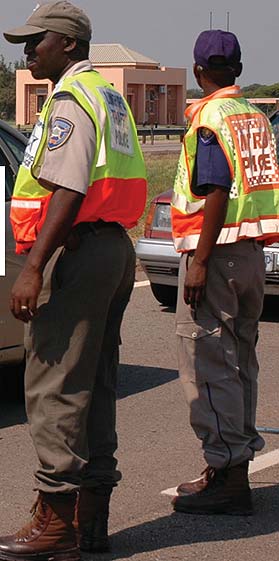
-
Improve analyses of crime trends to improve our performance in both prevention and the combating of crime.
-
COMMUNITY INTERVENTIONS AND PARTNERSHIP
-
Respond to the fact that, as in other countries, most violent crimes occur in the poorest areas of our country and require strong and sustained community interventions focused on crime prevention.
-
Further improve the functioning and effectiveness of the vitally important community police forums.
SECURITY INDUSTRY
The increase in some crimes during the security workers' strike has made it clear that the security industry cannot be handled simply as the business of the private sector. We need to strengthen the regulatory system in relation to such issues as pay levels, personnel screening and the enforcement of guidelines on cash-delivery vehicles.
We will review this matter this year, so that in addition to improving the work of the police, we can together with the private security industry create an environment in which the public enjoys the security it expects.
IN 2004, WE COMMITTED TO PROGRAMMES TO:
-
make sure that the public sector plays its role in growth, reconstruction and development.
PROGRESS AND CHALLENGES
Programmes to improve local government capacity continue, including the training of representatives elected last year.
There are too many unfilled local government posts - a quarter of municipalities did not have municipal managers by
September 2006. Most ward committees (80%) have been established.
We are aligning planning instruments across government (National Spatial Development Perspective, provincial growth
and development strategies and integrated development plans).
Districts and metros have held their growth and development summits.
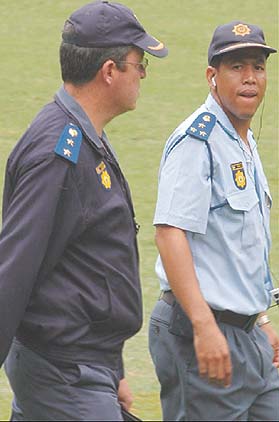
IN 2007, WE WILL:
-
continue to improve services to the people.
BUILDING CAPACITY AND EFFICIENCY
-
Strengthen monitoring and evaluation capacity across government.
-
Complete, in the next 18 months, legislation on a single public service and relevant norms and standards, and policy on pay, medical aid and pensions.
-
Look at capacity and intervene in provincial departments responsible for local government and offices of the premiers, while continuing to improve capacity in national departments.
-
Intensify the public sector and national anti-corruption campaign and further improve the effectiveness of our anti-corruption strategies.
-
Roll out the Batho Pele campaign in local government; intensify outreach programmes, including izimbizo, and set up more multi-purpose community centres.
-
Further capacitate and support traditional leadership.
UNDERSTANDING SOCIAL NEEDS
-
The Community Survey starting in February will give government a picture of the circumstances of citizens across the country.
-
In October, 30 000 people in 8 000 households will begin to take part in the National Income Dynamics Study. It will track them over time to improve our understanding of socio-economic change in our society.
A BETTER AFRICA AND A BETTER WORLD
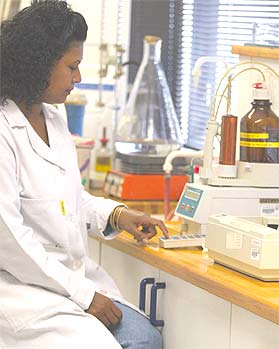
IN 2004, WE COMMITTED TO PROGRAMMES TO:
-
speed up the renewal of the African continent and increasingly contribute to the resolution of major challenges facing the world.
-
DURING 2007, WE WILL:
RENEWAL OF THE AFRICAN CONTINENT
-
continue working with the people of the Democratic Republic of Congo, Burundi, the Comoros and Sudan to translate progress towards peace and stability into reconstruction and social development
-
contribute to the resolution of remaining conflicts, particularly in Sudan, including Darfur, Côte d'Ivoire and Somalia
-
respond as far as we can, to the call of the African Union to help the people and government of Somalia to find solutions based on the need for national reconciliation
-
put in place the programme of action that will result from the completion of the African Peer Review of our country
-
continue working with the rest of our continent and our development partners to speed up implementation of New Partnership for Africa's Development (Nepad) programmes.
WORKING FOR A BETTER WORLD
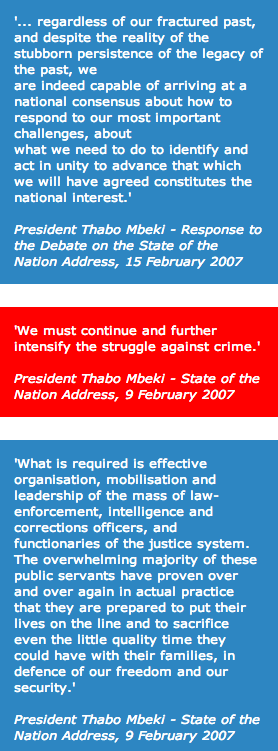
-
As a non-permanent member of the United Nations Security Council, we will do everything we can to play a part in furthering international peace and security.
-
We shall continue engaging the leaders of the peoples of Palestine, Israel, Iraq, Iran and other countries in the Middle East and the Persian Gulf.
-
We shall continue to strengthen our relations with other countries on the continent, our partners in India, Brazil and the People's Republic of China, other countries of the South, as well as Japan, Europe and North America.
-
We shall work for a speedy resumption of the Doha Development Round of World Trade Organisation negotiations, convinced that it is in the long-term interest of both developed and developing countries that these talks reach fruition.
WHAT IS THE NATIONAL BUDGET?
In February of each year, the Minister of Finance announces government's spending, tax and borrowing plans for the next three years. This is called the national Budget. It describes how government will raise money and how it will be spent. The national Budget divides money between national departments, provinces and municipalities.
SHARED GROWTH
The South African economy grew by 5% last year and is expected to expand strongly over the next three years. More jobs have been created and government has more money to spend on services such as education, health, policing and public transport. The challenge for our country is to make sure that we grow even faster, to create more jobs and reduce the level of poverty. The 2007 Budget contributes towards faster growth and shared benefits for everyone. Some of government's programmes provide immediate benefits, while others benefit all of us, and our children, in the long term. Spending for the future is called investment. Government is investing in public transport, clinics and hospitals, electricity, housing, water and schools to ensure that our economy continues to grow and that everyone has access to these services. We are also changing the way in which we do things to ensure that we build a secure country and improve the standard of living for all, for the long term.
A GROWING ECONOMY HELPS IMPROVE THE LIVES OF MORE PEOPLE THROUGH:
-
more jobs - over one million jobs have been created since 2004
-
housing, water, sanitation and electrification programmes reach more people with township development a priority of government
-
better public transport systems help to take people to and from places of work or to look for work
-
additional spending on education, health and welfare services allows more people to get better quality services
-
better access to social grants, more deserving people can benefit
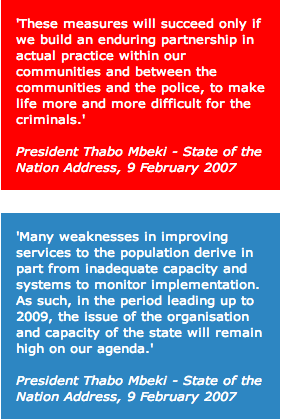
-
more police, better courts and more prison spaces to make our communities safer. The 2007 Budget supports economic growth and ensures that all share in the fruits of our economy so that we reduce unemployment and poverty.
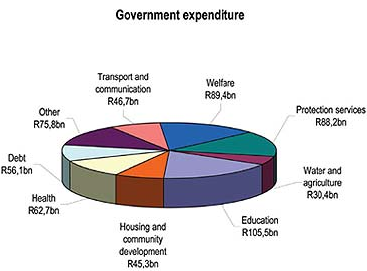
BUDGET HIGHLIGHTS
The main changes to the Budget for the next three years are:
SPENDING CHANGES
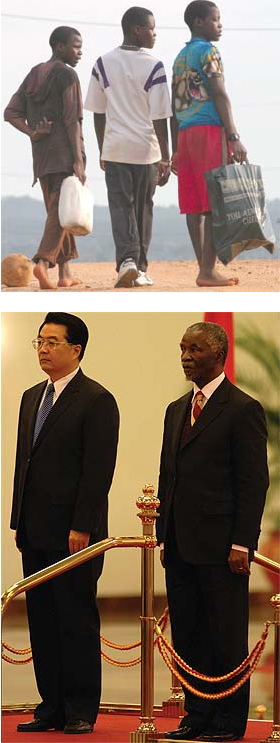
-
R8,1 billion extra for teacher salaries, teaching assistants, support staff in schools and districts.
-
R7,2 billion extra for health to cover HIV and AIDS, additional pay for health workers and for improving hospitals.
-
R17,4 billion for the 2010 FIFA World Cup.
-
R7,8 billion for public transport, water and other municipal infrastructure.
-
R2,7 billion for housing.
-
R2,4 billion for additional police.
-
R1,5 billion to improve the work of the courts.
TAX PROPOSALS
-
The tax on retirement funds will be abolished, helping to boost retirement savings.
-
The secondary tax on companies will be reformed and the rate lowered from 12,5% to 10% to help support economic growth.
-
People younger than 65 years earning below R43 000 will not pay any income tax.
-
Personal income tax will be reduced by R8,4 billion.
-
Taxes on a litre of petrol or diesel will rise by 10 cents from 4 April 2007.
-
A can of beer will cost 5 cents more.
-
A packet of 20 cigarettes will cost 60 cents more.
-
A 750 ml bottle of liquor (spirits) will cost R1,88 more.
SOCIAL GRANT INCREASES
South Africa pays social grants to over 11 million people. These grants are an important contribution to fighting poverty and creating a decent life for all. We now spend about 13% of the Budget or R62,4 billion on paying social grants. From 1 April 2007, the following increases to our social grants will come into effect:
-
Old Age Pension - from R820 to R870 a month
-
Child Support Grant - from R190 to R200 a month
-
Disability Grant - from R820 to R870 a month
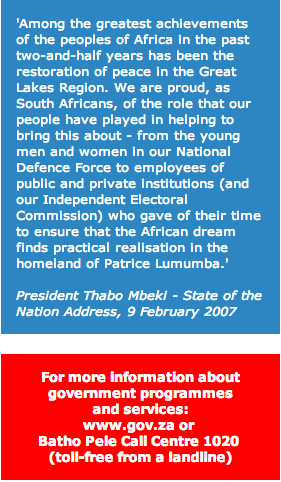
-
Foster Care Grant - from R590 to R620 a month
-
Care Dependency Grant - from R820 to R870 a month.
It is important that everyone who qualifies should receive their social grants. But unfortunately, some people have tried to get grants when they don't qualify. They have been charged with fraud in the courts. The 2007 Budget makes available R10 billion over the next three years to improve the services provided by social welfare organisations in the community. Through partnerships with community organisations, we can best serve those in need.
NEW SOCIAL SECURITY SYSTEM TO BENEFIT ALL
Between 2007 and 2010, government will extend the social security system so that the benefits of growth are shared by all.
Many working people do not save enough for their retirement or for unexpected events such as early death or disability. Some people who do save, lose their money because they invest in the wrong products. The new social security system will ensure that everyone saves while they are earning an income, and that their money is safely invested. It will provide protection against unemployment and will pay benefits if workers die or are disabled.
The Government will pay a refund through the tax system to help low-wage workers pay the social security contribution. This will also lower the cost of creating jobs and encourage companies to hire more workers.
By saving for retirement through the new social security system, all South Africans will together contribute to better protection against accidents or unemployment and more security in old age.
Over the next three years, our tax system together with the systems used to pay our social grants, unemployment insurance payments and road accident fund claims will be changed so that government can collect tax and deliver social security benefits to all at a low cost.
Many of these ideas need more work. Government will be releasing more information on these changes during the course of the year.
IMPROVING SCHOOL EDUCATION
Improving the quality of schools has been a major priority of government since 1994. In 2006, government introduced no-fee schools for the poorest children, aimed at ensuring that nobody could be excluded from education because they could not afford to pay fees.
Since 2002, there has been a large increase in funding for new classrooms and schools, and for electricity, water and sanitation facilities in schools that did not have these facilities.
The 2007 Budget makes available R8,1 billion to improve teacher pay, to hire teaching assistants and to recruit clerical support staff in schools and district offices. These initiatives are aimed at further improving the quality of school education for all.
While government has done well in getting almost all children into schools and providing more money to schools, we have much more to do to improve the quality of education. Our performance is not yet good enough. We need strong support from parents and communities to ensure that schools perform to the highest standards. Only strong partnerships can improve our schools.
2010 FIFA WORLD CUP PREPARATIONS UNDERWAY
In three years' time, South Africa will host the world's biggest sporting event. The 2010 FIFA World Cup is an opportunity for our country to showcase our people, talent, natural beauty, culture and organisational abilities.
The World Cup also provides an opportunity for us to improve our public transport infrastructure, road networks, policing capacity and communications facilities. Many of these projects will leave a lasting impact on our communities and on the quality of life for many.
The national Budget makes available R17,4 billion for infrastructure related to the tournament. Of this amount, R8,4 billion is for stadiums and R9 billion is for transport infrastructure and to upgrade areas around the stadiums.
The money allows for new stadiums to be built in Cape Town, eThekwini, Nelson Mandela Bay, Mbombela and Polokwane. Stadiums in Johannesburg (Soccer City and Ellis Park), Mangaung, Rustenburg and Tshwane will be upgraded to meet FIFA World Cup standards.
The building of these stadiums has begun and plans are being prepared to ensure that everything is ready for the big event in 2010. All South Africans are united behind the World Cup and our team, Bafana Bafana.
- Ndivhuwo Khangale
The police need your help: ACT! Agains crime together
The police need your help: ACT! Agains crime together sadmin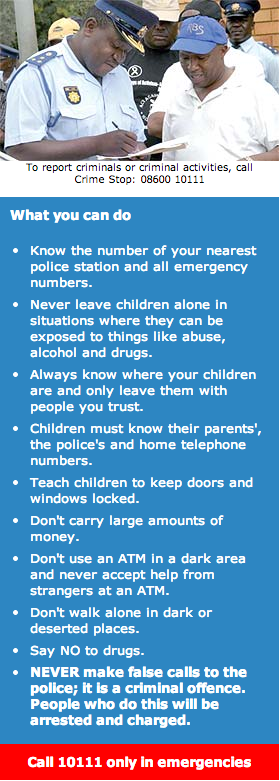 The South African Police Service needs support from government, business and especially communities, to report criminals and criminal activities.
The South African Police Service needs support from government, business and especially communities, to report criminals and criminal activities.
A concerned parent in a rural area, for example, phoned the police's Crime Stop number to report a father who had been sexually abusing his 13-year-old daughter since she was 9 years old.
Police investigated the case. The father was arrested, found guilty and given a life sentence. The girl was saved from further abuse and her life changed forever. It all started with a call to the Crime Stop telephone number, 08600 10111.
Communities
It is with this number that the South African Police Service is asking communities to ACT. The police use the word ACT to encourage communities to act against crime together by reporting criminal activities to them.
The word comes from the letters A for Against, C for Crime and T for Together.
Crime Stop is made up of many call centres that get information about criminals and their activities from you - the public.
Trained staff
Trained staff at the call centres will ask you some questions before you give any information to the police. You don't have to give your name or any identification. No number identification or other information that can be used to trace you is allowed
at Crime Stop.
When you call, you will get a reference number that you can use if you want to make a follow-up call about the case.
The Crime Stop number 08600 10111 is different from 10111.
The number 10111 must only be used in emergencies by victims of crime asking for help and when a crime has been committed and police presence is needed, or by witnesses to a crime reporting an emergency.
Both the Crime Stop number and 10111 operate 24 hours a day.
- Ndivhuwo Khangale
Tobacco laws: We have a right to clean air
Tobacco laws: We have a right to clean air sadmin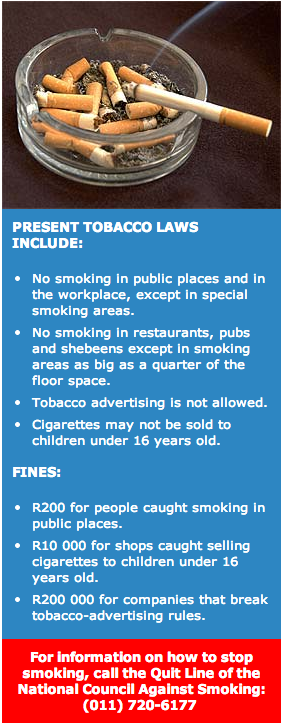 Tobacco causes 30 000 deaths a year in South Africa, said Dr Yussuf Saloojee, Director of the National Council Against Smoking. He was speaking to Parliament's health portfolio committee in January.
Tobacco causes 30 000 deaths a year in South Africa, said Dr Yussuf Saloojee, Director of the National Council Against Smoking. He was speaking to Parliament's health portfolio committee in January.
Domestic workers and children
Second-hand smoke breathed in from smokers' cigarettes, is harmful to non-smokers.
The committee talked about possible new laws that would protect children in cars and domestic workers in houses from second-hand tobacco smoke.
Salojee said it was wrong that present laws did not include private homes in the definition of "workplace." He also said smoking should be banned in cars with children.
Why tobacco laws?
Government cannot stop people from smoking because everyone has the right to choose how to behave. But everyone also has a right to clean air and an environment that is not harmful to their health.
Tobacco laws are necessary to protect people from the harmful effects of smoking.
The country's economy as a whole also suffers as a result of smoking-related illness. It causes a loss of productivity in the workplace. It also causes breadwinners to die from diseases like lung cancer and heart attacks.
The Medical Research Council found in a study that for every R1 the government received from taxes on cigarettes, R2 was spent on treating illnesses caused by tobacco and on loss of productivity.
Inform and educate
Tobacco laws are also necessary to help inform and educate people about the dangers of smoking. For example, warnings have to be printed on cigarette packets by law, telling people that smoking causes cancer.
Laws make it more difficult for smokers to keep up the habit. Limitations on smoking means that people who already smoke are encouraged to smoke less, or to stop smoking altogether.
People who have never smoked may be put off from starting to smoke. For example, if smokers in offices have to go to special areas to smoke instead of smoking at their desks, or if they can't smoke in restaurants and other public places, they may find it easier not to smoke at all.
"Light" cigarettes
Studies have shown that switching to "light" cigarettes does not reduce the dangers of smoking. Most people are not aware of this.
If the suggested new tobacco laws are passed, all harmful items that go into cigarettes must be made known.
- Louise van Niekerk
Working extra hard and saving jobs
Working extra hard and saving jobs sadmin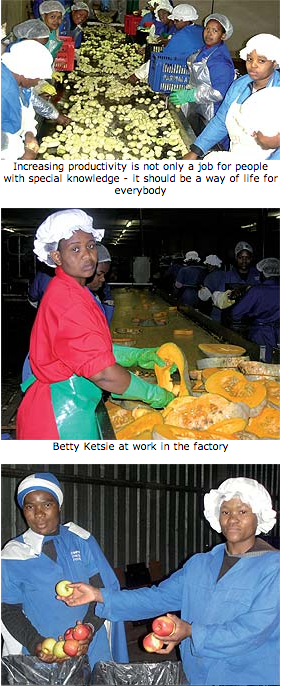 MAKING OPPORTUNITIES WORK FOR YOU
MAKING OPPORTUNITIES WORK FOR YOU
Betty Ketsie's red coat is different from the blue work suits worn by the other workers at the factory.
"The colour of my coat," says Ketsie with a shy smile, "shows that I am the supervisor. I am also one of the longest serving workers here."
Not enough profit
But Ketsie's smile quickly disappears when she starts talking about how she nearly lost her job in 2001 when the factory was not making enough profit.
The problems at Dimpho Fresh Foods, near Vereeniging in Gauteng,
would have seen about 20 of the 100 workers losing their jobs. Many of them were women who were single parents.
For Ketsie, a 40-year old single mother, this would have meant losing the R250 she earned per month. She wouldn't be able to support her three children or paytheir transport to school.
Thanks to the National Productivity Institute (NPI), Dimpho Fresh Foods improved their performance and the jobs were saved. Ketsie's salary was increased to R706 a month.
More productive
The NPI was started 40 years ago and falls under the Department of Labour. The organisation helps private and government institutions
to be more productive and competitive. This is done through a number of programmes that are supported by government departments and organisations working with government.
Social Plan
One of the National Productivity Institute's programmes is the Social Plan funded by the Department of Labour. Its main aim is to help companies that are in trouble and to prevent job losses.
Dimpho Fresh Foods was one of the companies that benefited from the Social Plan. The company buys vegetables from farmers and prepares them to be used by the mines in their kitchens.
In 2004, some business partners bought Anglo Farms and re-named it Dimpho Fresh Foods.
But the company was in trouble and the production was poor says Dimpho's managing director, Bruce Morley. Many things, including management, the relationship with farmers and the general operations caused this.
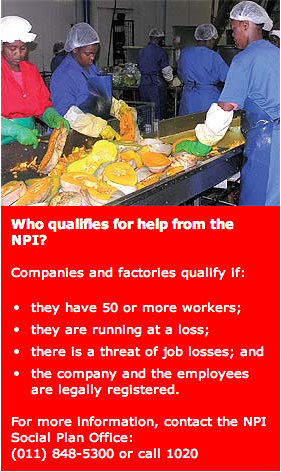
In June 2006, when they were already planning to cut down the number of workers, they heard about the National Productivity Institute through a radio advertisement.
Consultant
"The National Productivity Institute appointed a consultant to find out what our problems were," said Morley. "After he spent a month with us, he had enough information to tell us how we could improve our business."
"Today we are back on our feet. Production has improved, we are making a profit and we have increased our worker's salaries. We now make about R1,4 million a month and are ready to employ more people."
By March 2006, the National Productivity Institute helped a total of 122 companies and saved thousands of jobs.
Advice
The National Productivity Institute sometimes goes to companies to offer their help, but usually the companies come to them with their problems.
When companies come to them, they send their consultants to check the financial statements and other important documents. They also have meetings with both the employers and the workers.
"After helping a company, we make sure they don't get into trouble again by visiting them regularly and giving them advice," said Mario Govinder of the NPI.
Companies have to pay 35 per cent of the total cost of the NPI's service.
- Ndivhuwo Khangale
HOW TO BE MORE PRODUCTIVE
The National Productivity Institute says improving productivity is not only a job for people with special knowledge - it should be a way of life for everybody. They give the following tips:
-
Make a decision every day to be more positive and to do the best you can in everything you do.
-
Plan your day. Make a list of goals for every day and tick them off as you complete them.
-
After planning, prepare for everything. Make sure you have all the right tools to complete your goals. But remember productivity is about doing more with less, so use only what you really need.
-
If you have set a goal, stick to it even if you are faced with problems. You will have a great feeling of success when you finally reach your goal.
-
Check your productivity. Ask yourself every few hours: "Is this the best use of my time today?"
-
Be creative. Think of better ways to do things. You don't always have to work harder, sometimes just more intelligently.
-
Take responsibility for everything you do. Try to do everything 100 per cent right the first time.
-
Set an example to your fellow workers. Don't waste resources, including time. Remember you are paid to use your time productively.
-
See yourself as an important part of making our country more productive. No matter who you are or what you do, you play an important role in making the country more successful. By each of us being more productive and finding better ways of doing things, we are contributing to the economy and helping to improve the lives of all South Africans.
Youth take a look at HIV and AIDS
Youth take a look at HIV and AIDS sadmin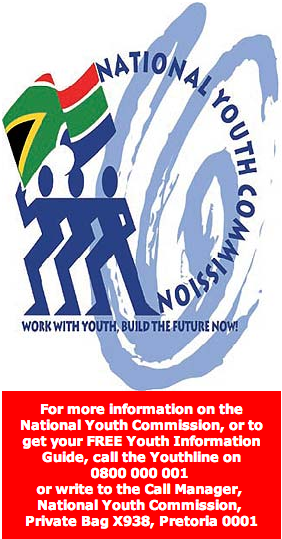 More than 30 youth leaders, youth health experts and activists attended a meeting organised by the Youth Commission on youth health, HIV and Aids and substance abuse in Pretoria recently. They represented national youth organisations and youth health non-government organisations.
More than 30 youth leaders, youth health experts and activists attended a meeting organised by the Youth Commission on youth health, HIV and Aids and substance abuse in Pretoria recently. They represented national youth organisations and youth health non-government organisations.
Youth Commission Chairperson, Nomi Nkondlo, said our youth should be at the forefront of developing and putting into place policies and plans on the issues of health and HIV and Aids.
Deputy President
Following this meeting, Deputy President Phumzile Mlambo-Ngcuka, opened the first meeting of the Youth Health Working Group at the Union Buildings.
The purpose was to talk about the South African National Aids Council's National Aids Strategic Plan. Topics included how to meet targets to reduce the spread of HIV and Aids.
The Youth Commission was asked to manage the youth's contribution to the new Aids Strategic Plan. A gathering of different youth organisations will take place later in the year to talk about contributions to the Plan.